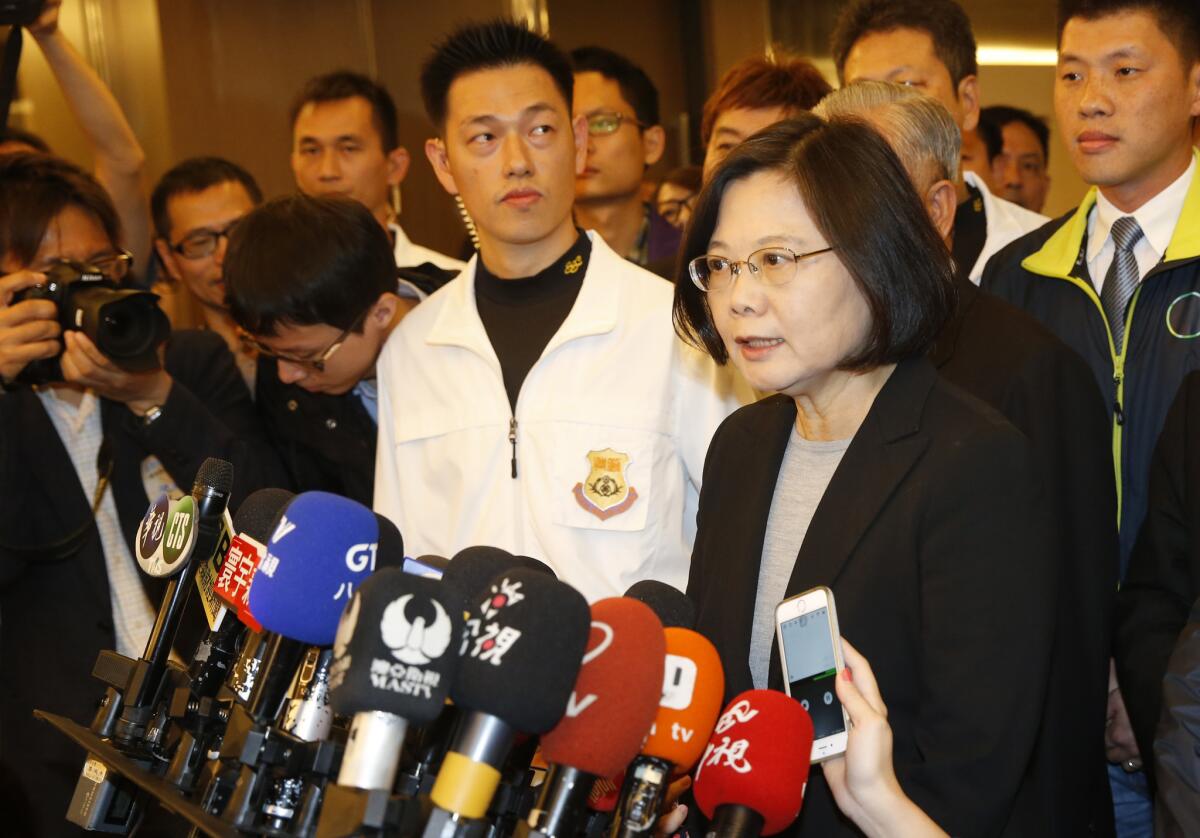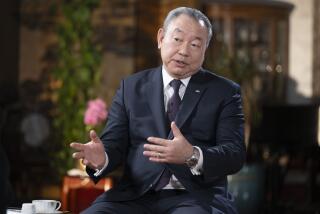Taiwan’s Tsai Ing-wen has presidency, and history, within her reach

Taiwan’s opposition Democratic Progressive Party, DPP, 2016 presidential candidate Tsai Ing-wen speaks to media before attending the Taiwan Econimic Development Forum in Taipei, Taiwan, Tuesday, Dec. 22, 2015.
- Share via
Reporting from Taipei, Taiwan — Four years ago this week, Tsai Ing-wen stood before thousands of crestfallen supporters in yellow raincoats in the dark of night. The lawyer-turned-politician had just lost Taiwan’s presidential election to incumbent Ma Ying-jeou, extending her party’s exile from power for another four years.
“I bear the responsibility for this defeat,” she said, conceding to her Nationalist Party rival and announcing she would step down as head of the Democratic Progressive Party. But she was hardly defeatist, despite the 51%-45% loss. “There will be a future for us. Next time, we will make that final mile,” she pledged. “Dear people of Taiwan: One day, we will come back.”
Come Saturday, the 59-year-old, who has a master’s degree from Cornell University and a doctorate from the London School of Economics, is poised not only to make good on that vow but also to make history.
See more of our top stories on Facebook >>
Having held a double-digit lead in opinion polls for months, Tsai appears all but certain to become Taiwan’s first female president. Moreover, she may very well sweep her DPP into control of parliament — the first time since Taiwan’s modern political era began in 1949 that the Nationalists have lost control of the chamber.
Long the main opposition party, DPP has held the presidency only once before, from 2000-2008 under Chen Shui-bian. But in contrast to Chen’s strong leanings in support of formal Taiwanese independence from mainland China and his unpredictable style, Tsai cuts more of a cautious, wonky figure. She has carefully calibrated her comments on Taiwan’s political status throughout the campaign, saying she is committed to a “consistent, predictable, and sustainable relationship with China” while robustly defending Taiwanese autonomy and democracy.
Ma’s pursuit of closer economic ties with the mainland has irritated many voters, who say his policies haven’t improved the fortunes of the average Taiwanese; Taiwan’s economy grew just 1% last year. Ma’s approval ratings have been in the basement, and his party has run a disorganized campaign, switching presidential candidates late in the fall.
But Tsai has taken strong steps to recast her image in the last four years, spending more time engaging with grass-roots voters while cultivating relationships in Washington. The U.S. is Taiwan’s key ally and has vowed to defend the island of 23 million in the event of an attack by China, which regards it as a renegade province, but Washington has been wary of the DPP since the Chen era.
“Tsai is a much better candidate this time. I think she spent the last four years thinking about what she needed to do to be successful,” said Shelley Rigger, professor of East Asian politics at Davidson College in North Carolina. “And her relationship with U.S. is much better than it was four years ago.”
That’s classic Tsai, say friends and former colleagues who describe her as naturally shy and someone who rarely takes quickly to personal relationships (she’s single and has no children), but is hard-working, detail-oriented and deft at anticipating people’s wants.
From 2000 to 2004, Tsai ran the Mainland Affairs Council, Taiwan’s government office that handles policymaking toward mainland China. Her colleagues regarded her as a “perfectionist,” said Lin Chong-pin, a retired strategic studies professor who worked as Tsai’s first deputy. “She would call our [PR] colleagues after midnight to correct what the media had printed,” he recalled. “She was nicknamed ‘Correction Tsai.’”
But Tsai had a knack for foresight, he added. “What amazed me most is that she … answered my questions before I ever asked them,” said Lin. “You cannot learn that from Ph.D. courses.”
NEWSLETTER: Get the day’s top headlines from Times Editor Davan Maharaj >>
That anticipatory sense, he believes, will help Tsai fend off detractors, be they domestic or overseas. (Beijing, which has referred to Tsai in the past as a “troublemaker,” has warned that a DPP victory could raise cross-strait tensions.) “Before you attack or criticize her, she will have an answer ready before you even fire a bullet,” Lin said.
As a two-time chair of the DPP, she has earned a reputation for pulling factions together and consulting broadly. Ma’s administration has been accused of being a “black box,” and sounding out too few people before making decisions, so that quality is also resonating with voters, particularly young people. Tsai has also shown a willingness to ally with candidates from new small parties whose politics align with hers.
“You need to communicate with people here … and she’s always been emphasizing communication,” said political author Chang Ching-wen, who recalled that in 2003, while leading the Mainland Affairs Council, Tsai and her aides personally contacted every legislator – more than 200 people then – to sound them out on revisions to guidelines on how Taiwanese interact with the mainland.
In 2010, Tsai ran for mayor of New Taipei City, but was defeated by the Nationalist Party’s Eric Chu (whom she’s now squaring off against in the presidential race). Following that failure and her 2012 election loss to Ma, Tsai traveled extensively in Taiwan and abroad, and founded the Thinking Taiwan Foundation and a bilingual website devoted to Taiwan affairs.
This fall, she published a memoir, “Ing’s Clique: The Last Mile to Light Up Taiwan,” about her journeys. “I have fallen, and tried to get up,” she wrote. “In the past few years, I have traveled around, trying to observe and understand the problems that people are facing.”
In the final week of campaigning, Tsai has been working her way northward from the DPP’s traditional stronghold in southern Taiwan. Appearing at a rally in Tainan on Sunday evening, she promised to not let her supporters down this time. “Six days from now, we will win back Taiwan,” she told the crowd.
“She’s got a lot of appeal. After last election there was some very nasty I-told-you-so’s,” said Rigger. “Now, though, she’s the hope of the party, and there isn’t that kind of fog of resentment in the DPP. If they are going to win it, will be because she pulled it out, and she led them to victory.”
Jennings is a special correspondent.
Follow @JulieMakLAT for news from Asia
ALSO
Taiwanese turn old shipping containers into sheds, offices, homes and more
U.S. flies B-52 bomber near North Korea after nuclear test
As China’s economy slows, workers feel the sting
More to Read
Sign up for Essential California
The most important California stories and recommendations in your inbox every morning.
You may occasionally receive promotional content from the Los Angeles Times.














